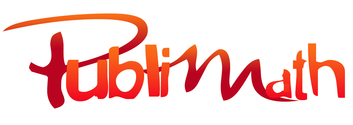« Dig where you stand » 5. Proceedings of the Fifth International Conference on the History of Mathematics Education. ICHME-5. The mathematics teachers’ journal Euclides in the Netherlands in change, 1945-1976. p. 189-204.
(Le journal "Euclides" pour les professeurs de mathématiques dans les Pays-Bas en mutation, 1945-1976.)
Une version texte intégral est en téléchargement sur le site Bibliothèque numérique des IREM et de l’APMEP Télécharger
Auteur : van Hoorn Martinus
Résumé
Après la Seconde Guerre mondiale, il existait encore un journal de professeurs de mathématiques aux Pays-Bas. Le contenu de la revue mettait l’accent sur les méthodes traditionnelles d’enseignement. On n’y encourageait pas de changements majeurs au programme et les enseignants n’étaient pas consultés. Mais les temps changeaient. Pour diverses raisons, dont un accord avec les organisations d’enseignants de l’enseignement pré-universitaire, et l’arrivée d’un nouveau rédacteur en chef, Johan Wansink, dans les années 1950, le contenu de la revue fut modernisé, avec des articles sur l’évolution de la situation dans d’autres pays, et prônant des modifications des programmes. Wansink est resté le rédacteur en chef jusqu’en 1968. Son successeur, Gerrit Krooshof, devait rendre le journal accessible à tous les enseignants du secondaire, nécessité consécutive aux changements majeurs dans le système éducatif néerlandais. Les limites entre les différents types d’enseignement secondaire, pré-universitaire ou non, avaient été effacées. Krooshof devait également composer avec un nouveau programme contenant des mathématiques modernes. Abstract After World War II, one mathematics teachers’ journal still existed in the Netherlands. Its principal editor was Pieter Wijdenes, who was dominating in many discussions on mathematics education. The content of the journal emphasized a traditional way of teaching. Major curriculum changes were not stimulated, and organizations of teachers were never consulted. But things were changing. The publisher wanted a safer financial base, and, of course, Wijdenes was becoming older. Therefore, the publisher reached an agreement with the organizations of teachers at pre-university schools, ensuring their support. Soon, in the 1950s, a newly appointed editor, Johan Wansink, even brought the journal into the hands of the organizations. Wansink also wanted an editorial team, with editors collaborating for the journal. He succeeded in this, while maintaining his leading role as the chief editor. He modernized the content of the journal, with articles on developments in other countries, and he stimulated necessary curriculum changes. Wansink remained the chief editor until 1968. His successor was Gerrit Krooshof, who had to make the journal accessible for all mathematics teachers, at any secondary school. He had to do so because of a major change in the Dutch educational system. Boundaries between the different kinds of secondary education, pre-university or not, were erased. Krooshof also had to deal with a new programme containing some New Math. He made the journal Euclides more open indeed, and provided discussions when suitable or needed. So, within 20 or 30 years, the journal Euclides underwent major changes, it had become the journal of the organizations, its editors worked in a team, its content had been made suitable for many more teachers, and discussions were stimulated. There were no worries about surviving.
Ainsi, en 20 ou 30 ans, le journal Euclides a subi de profonds changements : il était devenu le journal des organisations d’enseignants, ses éditeurs ont travaillé en équipe, son contenu a été adapté à beaucoup plus d’enseignants et les discussions ont été encouragées.
Notes
Chapitre des Actes de la cinquième Conférence Internationale sur l’Histoire de l’Enseignement des Mathématiques (ICHME 5).
Données de publication
Éditeur Drukkerij Baas, Nieuwerkerk aan den IJssel Utrecht , 2019 Format A4, p. 189-204 Index Bibliogr. p. 203-204
ISBN 90-823679-6-3 EAN 9789082367966
Public visé chercheur, enseignant, formateur
Type chapitre d’un ouvrage Langue anglais Support papier
Classification
